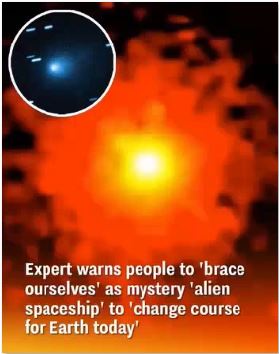
Space enthusiasts are abuzz this week as a rare visitor from beyond our solar system moves through space — and one theoretical physicist’s remarks have sparked lively debate. The object, known as comet 3I/ATLAS, is only the third confirmed interstellar object ever observed near our solar system. While astronomers stress there’s no cause for concern, a leading researcher playfully suggested that if it were some kind of advanced craft, this could be the moment it reveals itself — a comment that quickly ignited curiosity and imagination across the internet.
First discovered by NASA’s ATLAS survey earlier this year, comet 3I/ATLAS immediately stood out for its unusual properties. Its origin remains uncertain, and it’s traveling at astonishing speeds — over 130,000 miles per hour — as it passes through the solar system. Harvard astronomer Avi Loeb, known for exploring unconventional questions about interstellar phenomena, proposed in a recent paper that while the object is almost certainly natural, science should remain open to all possibilities. Researchers emphasize that this is a conceptual thought experiment, not a claim, and that nature alone can create remarkable cosmic events.
The comet’s shifting tail has added intrigue, displaying dynamic changes that occur naturally but often capture public imagination. Loeb humorously noted that if any advanced civilization ever wanted to demonstrate its presence, the comet’s perihelion — its closest point to the Sun — would be an ideal time, referencing the Oberth effect, a real principle in spaceflight where acceleration near a massive body increases efficiency.
Astronomers and space agencies agree there’s no evidence 3I/ATLAS is anything other than a comet, and monitoring continues as it moves through our cosmic neighborhood. Still, the object has reignited excitement about what lies beyond our solar system. Whether studied through science or imagination, it serves as a reminder of the vast mysteries of space — and how even a single icy traveler can inspire wonder across the world.